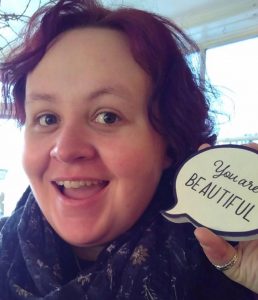Volunteer Management Officer
Development Office
Member of the University since 2001.

Your coming out story…
In my early teens I got teased a lot by friends who insisted I was gay, although I really didn’t know it for sure at that point. After a while I stopped hanging out with those people and at 16 my best friend told me she was bi. My response was “Yes I know. Me too.” To which she responded “I know”. And then we went to our History class. It was very easy to talk to her about it after that which was a great relief.
I came out publicly at 21 and really wish I had done so earlier – particularly at university where I would have had a lot more peer support and champions to look to. My parents were shocked I think and quite ignorant about what bisexuality was (the usual stereotypes of ‘greedy’, ‘indecisive’ or ‘promiscuous’) but they accepted it easily enough. Most of my friends had either already suspected, were queer themselves or weren’t bothered about it at all.
Did you have any LGBT+ role models growing up? Who were they and why?
In my personal life I had no LGBT+ role models – or at least no positive ones – my uncle was bisexual but hid it for years. After he was inadvertently outed by a 4-year old me he had a lot of partners and very unhealthy relationships. I grew up thinking it was ok to be gay because you were born that way but bisexuals could choose and they were just being slutty. It took a long time for me to realise being bi was a thing in itself and I wasn’t just struggling to admit I was gay. I then spent my teen years in a very small village-like community who were pretty close-minded and intolerant so it was difficult to find people to aspire to. There were very few openly queer people in the media, particularly positive representations.
Have you suffered prejudice in your job or personal life and, if so, can you describe what effects it had on you?
During my time at Kent I’ve been open about being bisexual and never faced any issues. In a previous organisation I had to come out in order to explain why I found the manager’s homophobic comments about customers so upsetting. I then had a colleague stop talking to me because she perceived my friendliness toward her as a come-on. That wasn’t a great place to be yourself and was eventually the reason I left. The impact was though that I then actively sought organisations that had a positive EDI ethos and that I became more confident speaking about my sexuality with my colleagues.
In my personal life I have had mostly overwhelmingly strong support and have even almost turned my dubious parents into gay rights activists. Almost. I do have to have the ‘you spent a lot of time with X, do you like them?’ conversation way more than I should have to. And because I’m bi it happens pretty much any time I make a new friend. Very irritating because it then makes me very self-conscious and question every interaction.
What would you say to those who may be facing difficulties regarding their LGBT+ status at work?
Find someone you feel you can trust and be open with them. They might be able to help you make the decision whether or not to openly come out, or at least will be someone you can be honest about your life with until you do. In my experience it has been much easier to come out earlier on, so you can be yourself and not be worried about people finding out in other ways. Also, I find that colleagues appreciate your confiding in them or being honest. It’s not always easy to drop into conversation, especially if you don’t have a partner you can casually mention, but find a moment and bite the bullet. It’s so much easier.
What can we all do to make University of Kent a better place for being an LGBT+ member of staff?
Be open about being LGBT+ or being an ally so people can come to you in confidence (or solidarity). Provide a safe space for discussions with all staff and students and opportunities to learn more about LGBT+ people – there are no stupid questions and even I get confused about all the letters or am concerned about saying the wrong thing and upsetting people.
What do you think of being LGBT+ in Kent?
I think the University of Kent is great at celebrating diversity in all its wondrous forms, and the people and resources are great. I think Kent the region has practically no queer scene and that organisations only appear to be gay-friendly at Pride (which is a very recent thing).
Why do you want to be an LGBT+ role model? Why is it important?
Because I never had one and I think my experience would have been greatly improved if I had.

